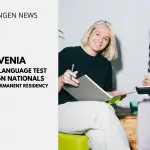Post Study Options: How to Stay in Germany After Your Studies
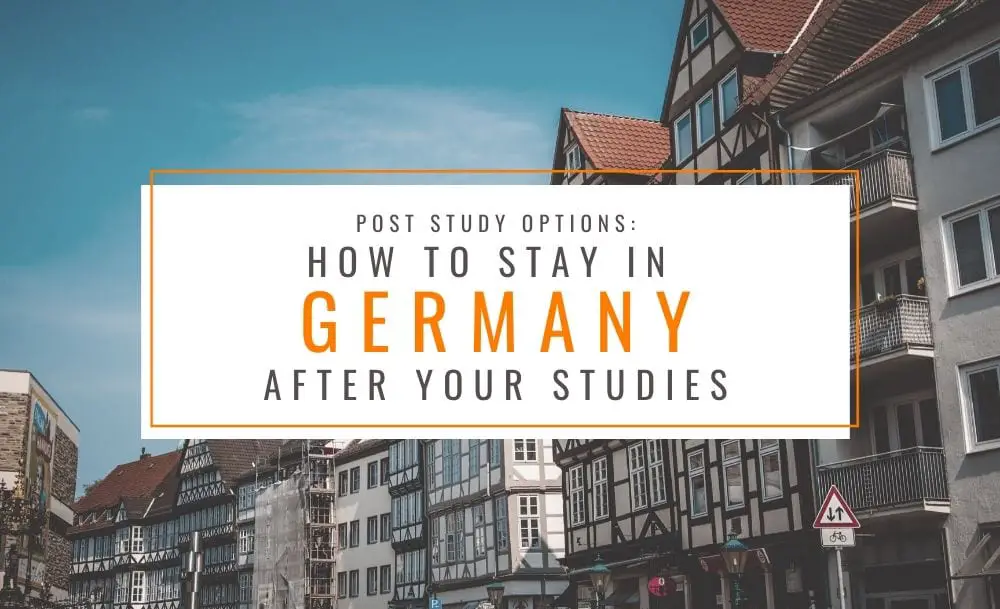
- Temporary Residence Permit or Limited Residence Permit (Aufenthaltserlaubnis)
- Permanent Residence Permit
- German Citizenship
Germany, with its incredibly unique cities and with the largest economy in Europe, is a hotbed for opportunities. There’s a huge demand for technical talent across a variety of industries and companies of all sizes. The country is one of the world’s most prominent exporters of machinery, electronic and electrical equipment, vehicles, pharmaceuticals and food. Volkswagen, BMW, Siemens and Bosch are just a few of the large companies in the country and it is no wonder that international students choose to stay after completing their degree.
Although Germany offers a large number of study programs in English, being proficient with the spoken German language is a huge advantage when looking for a job and opens immense job prospects. Speaking German is almost always a prerequisite especially for entry-level jobs. The common exceptions are jobs in tech/IT, and jobs at internationally oriented startups. Having a level B1 German Language certificate is one of the requirements in obtaining your residence visa.
Germany’s visa system is relatively simple, quick, and open compared to other nations in Europe. Like any other EU nation, access to the German labour market depends on your nationality. EU/EEA and Swiss citizens may reside in Germany for the purpose of taking up gainful employment if they have a residence permit which explicitly authorises them to do so. Australian, Israeli, Japanese, Canadian, South Korean, New Zealand and US nationals may obtain a residence permit from the relevant foreign authority once they have arrived in Germany. It is important to note, however, that they may not commence their intended employment until they have the permit.
Once you have figured out that you will stay in the country to find work after graduating, you should start planning while you’re still a student. Taking internship experience whilst studying is highly beneficial to you.
Want to know how to stay in Germany after your studies? The visa options below are available for you after completing your studies.
Temporary Residence Permit or Limited Residence Permit (Aufenthaltserlaubnis)
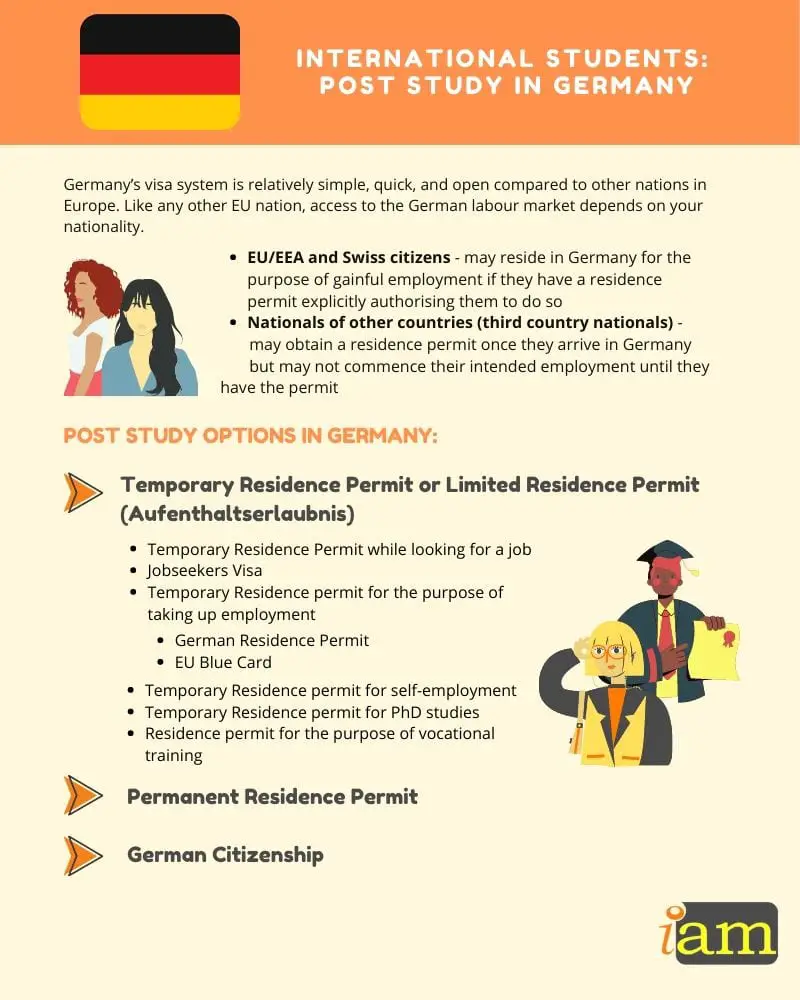
Temporary Residence Permit while looking for a job
As a foreign graduate of a German university (outside the nationals mentioned above), you enjoy a more favourable status compared to other non-EU citizens.
The moment you complete your studies, your student visa also expires however students can get 18 months of work visa after obtaining your German university degree. You need apply for this permit before your student visa runs out otherwise you will need to return to your home country. You can skip this step if you are already employed.
You can use this period to look for a permanent job which is related to your field of study while working part time to support yourself. In these 18 months, you can work as much as you like and take up any kind of employment to support yourself however experience in your field of study is a big advantage.
To qualify for this permit, you must fulfill the following conditions:
- Proof of a successfully completed course of studies (i.e. university degree)
- Proof of your health insurance coverage
- Proof of sufficient financial means to cover your costs of living
Jobseekers Visa – How to Stay in Germany after your Studies
If you returned to your home country after the course completion and want to return to Germany for career opportunities, you are eligible for a temporary short time visa up to six months. During this time, you can look after the different possibilities connected with your educational qualifications. Remember this short visa is not your permanent residence or work permit. This only helps you look for a permanent job. After you are employed on a permanent basis, you need to apply for a separate work and residence permit.
To qualify for this visa, you must present the following requirements:
- Academic or vocational qualification
- Secure financial means (blocked account or declaration of commitment)
- Proof of German language competence: minimum requirement is level B1 (CEFR) (compulsory for people with vocational training)
You should apply for this visa in your home country.
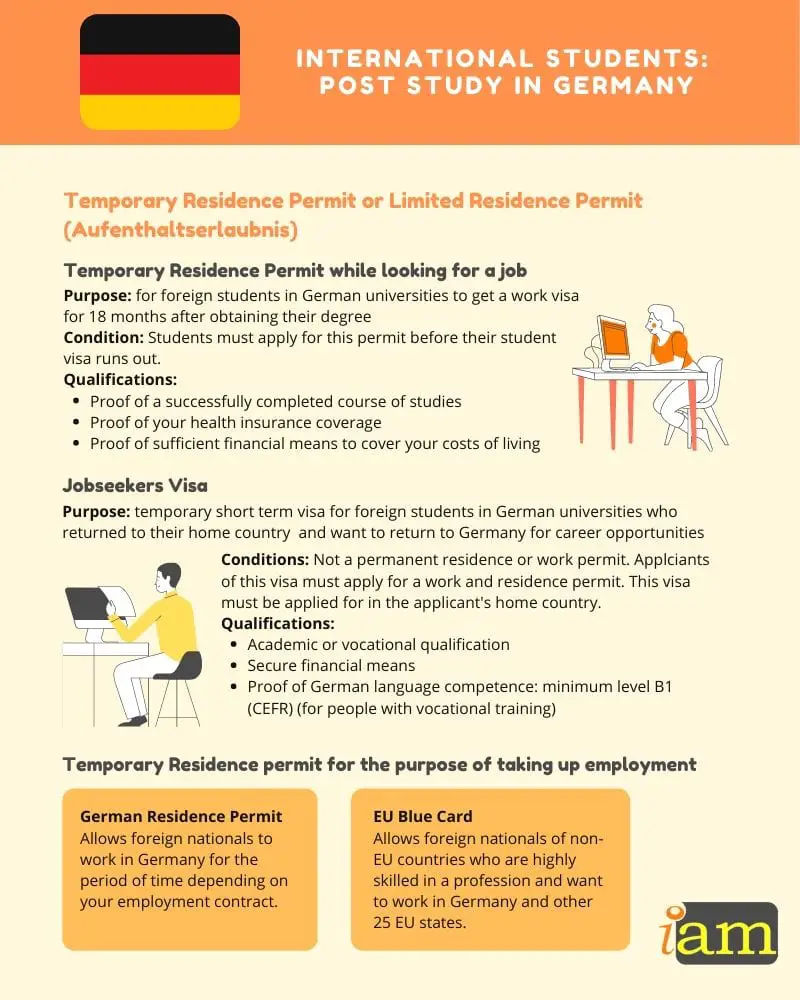
Temporary Residence permit for the purpose of taking up employment
As soon as you have a job offer which corresponds to your qualifications, you can choose whether you want to apply for a residence permit for the purpose of taking up employment or an EU Blue Card for the next part of how to stay in Germany after your studies.
German Residence Permit
Allows foreign nationals to work in Germany for the period of time depending on your employment contract. If your contract is for only 2 years, your permit will also be valid for 2 years. However, you can extend it as many times as you need as long as you maintain your employment status. If you plan to permanently stay in Germany then this is more advantageous to you.
EU Blue Card
Allows foreign nationals of non-EU countries who are highly skilled in a profession and want to work in Germany and other 25 EU states. Those who are more likely to get the EU Blue Card have an IT or STEM (Science, Technology, Engineering, Mathematics) background. If you intend to live and work in another EU state, the EU Blue Card may be more beneficial for you than the residence permit for taking up employment.
Various conditions are attached to both these residence permits. Depending on what you are planning to do in the future, either the residence permit for the purpose of taking up employment or the EU Blue Card can be advantageous for you.
To be granted this residence permit or the EU Blue Card, you have to fulfill the following requirements:
- Proof of a successfully completed course of studies (i.e. university degree)
- Proof of your health insurance coverage
- Proof of sufficient financial means to cover your living costs (German work contract)
- For EU Blue Card holders: minimum gross annual salary of EUR 55,200 or EUR 43,056 for MINT professions (year 2020)
Temporary Residence permit for self-employment
As a graduate of a German university, you can run a business or work as an independent professional, for example as an engineer. The circumstances and conditions for setting up a business vary depending on which country you come from and what residence status you have in Germany.
For some professions, you need to prove you have a specific qualification if you wish to work for yourself. These professions are called regulated professions (e.g. medical professions). When it comes to starting a business, a distinction is made between carrying out a commercial activity on a self-employed basis and working as a freelancer in a “liberal profession” (e.g. doctor, lawyer, auditor, interpreter, artist). This distinction has an impact on tax payments and on whether you need to register a commercial business.
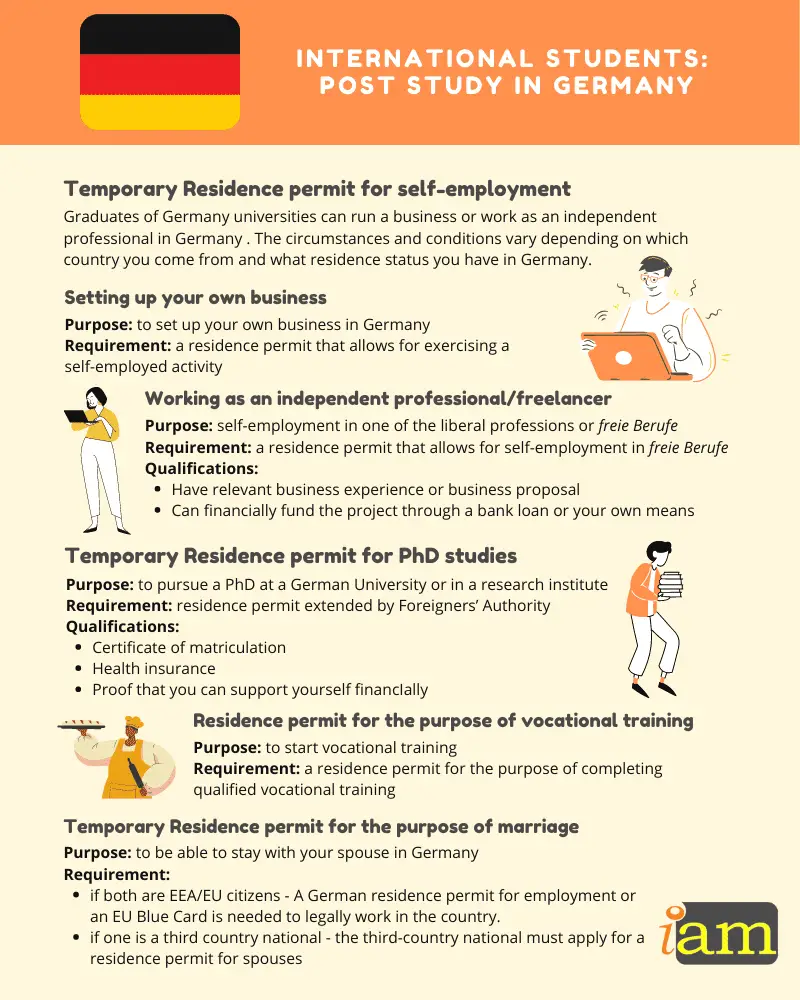
Setting up your own business
In order to set up your own business in Germany, you need a residence permit allowing you to exercise a self-employed activity (selbstständige Tätigkeit) (Section 21 Act on the residence – AufenthG).
Working as an independent professional/freelancer
If you want to be self-employed in one of the liberal professions (freie Berufe), apply for a residence permit that will allow you to exercise this kind of activity (Section 21 Act para. 5 on the residence – AufenthG). To do so, you will usually need to supply your CV, your final examination diploma of your studies, a description of the activity you intend to take up and a financial plan.
To qualify you must meet the following requirements:
- Have relevant business experience/business proposal
- Can financially fund the project through a bank loan or your own means
If your business idea is successful and you are able to make a living for yourself and your family, you can have your residence permit extended, which is initially limited to a maximum of three years. After just three years, you can obtain a settlement permit (Niederlassungserlaubnis), which will allow you to settle down in Germany for an unlimited period.
Temporary Residence permit for PhD studies
If you wish to pursue a PhD at a German University or in a research institute, all you have to do is to have your residence permit extended by your local Foreigners’ Authority. To do so, you will need your certificate of matriculation. Furthermore, you need to be able to prove that you have adequate health insurance and that you are able to support yourself financially.
Temporary Residence permit for the purpose of vocational training
International students may switch to another type of residence permit before they have completed their studies. Instead of continuing your course of studies, you can start vocational training and receive a residence permit for the purpose of completing qualified vocational training (Section 16b para. 4 Act on the residence – AufenthG). However, this is subject to special conditions and the examination through the Federal Employment Agency (BA). Even after you have completed your studies, you have the opportunity to complete vocational training in Germany and apply for a residence permit for the purpose of vocational training.
Temporary Residence permit for the purpose of marriage
Marrying a German citizen or a person who has a permanent residence permit in Germany allows you to stay in the country, but you will still need a residence permit.
If both of you are EU/EEA citizens then you can both live in Germany as you are entitled to freedom of movement. You need to have a German residence permit for employment or an EU Blue Card to legally work in the country.
If one of you are a citizen of a member state of the EU/EEA and the other is a third-country national then the partner not holding an EU/EEA citizenship must apply for a residence permit for spouses joining their partners so you can be together. There is no single German residence permit through marriage, but this means that you will just get your permit to stay in the country for family union purposes. Same-sex couples are also accepted in Germany and are eligible to get residence permits after they get married
To apply for a visa for your spouse to join you, you will generally need to provide your passport and a wedding certificate or proof of a registered or civil partnership. Another requirement for this permit is a good grasp of the German language at a B1 level. The residence permit will be temporary, but after a few years of marriage (usually 2 years) and time spent in Germany (3 years), the spouse becomes eligible to gain permanent residence.
During this time, the spouse can apply for permits that are for employment or study purposes.
Permanent Residence Permit
This allows foreign nationals to settle down in Germany indefinitely. If you have a permanent residence permit, your children and spouse are allowed to join you. They will first get a temporary residence permit, and after a few years, will be able to get the permanent permit.
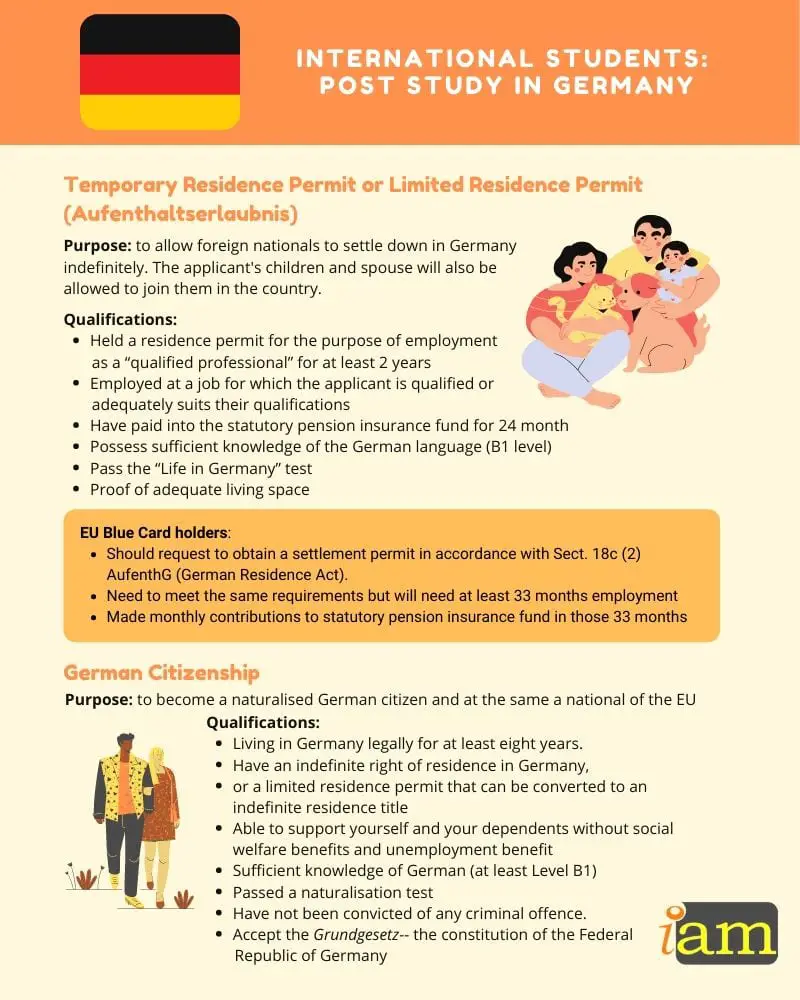
You can qualify if you meet the following requirements.
- You have held a residence permit for the purpose of employment as a “qualified professional” for at least 2 years (Residence permit in accordance with Sections 18a, 18b or 18d AufenthG (German Residence Act).
- You are employed at a job for which you are qualified or that adequately suit your qualifications
- You have paid into the statutory pension insurance fund for 24 months.
- You possess sufficient knowledge of the German language– B1 level in accordance with the Common European Framework of References for Languages (CEFR)– as well as knowledge of the legal and social order and of the German way of life. This can be proven by way of passing the “Life in Germany” test.
- You can provide proof of adequate living space.
If you are an EU Blue Card holder, you can request to obtain a settlement permit in accordance with Sect. 18c (2) AufenthG (German Residence Act). You need to meet the same requirements as above however instead of two years of employment you need at least 33 months of employment during which you made monthly contributions to the statutory pension insurance fund.
German Citizenship
Being a naturalised citizen makes you a German citizen and at the same a national of the European Union. It's the last step in how to stay in Germany after your studies.
To qualify you must satisfy the following conditions:
- You have been living in Germany legally for at least eight years.
- You have an indefinite right of residence in Germany (for example as an EU citizen with Freedom of movement, or as the holder of a settlement permit), or a limited residence permit that can be converted to an indefinite residence title.
- You are able to support yourself and your dependents without social welfare benefits and unemployment benefit
- You have sufficient knowledge of German. It is enough to be able to prove your oral and written German skills in a language exam to at least Level B1 (Common European Framework of Reference). A German school-leaving certificate or a vocational training diploma or university degree from Germany are also proof of your German-language skills.
- You have passed a naturalisation test.
- You have not been convicted of any criminal offence.
- You accept the Basic Law (Grundgesetz)which is the constitution of the Federal Republic of Germany.
- Travel Alert: UK Government Issues New Advice for India and Pakistan - 8 May 2025
- UK May Tighten Visa Rules for Some Nationalities - 7 May 2025
- Romania Off US Visa-Free List - 6 May 2025



